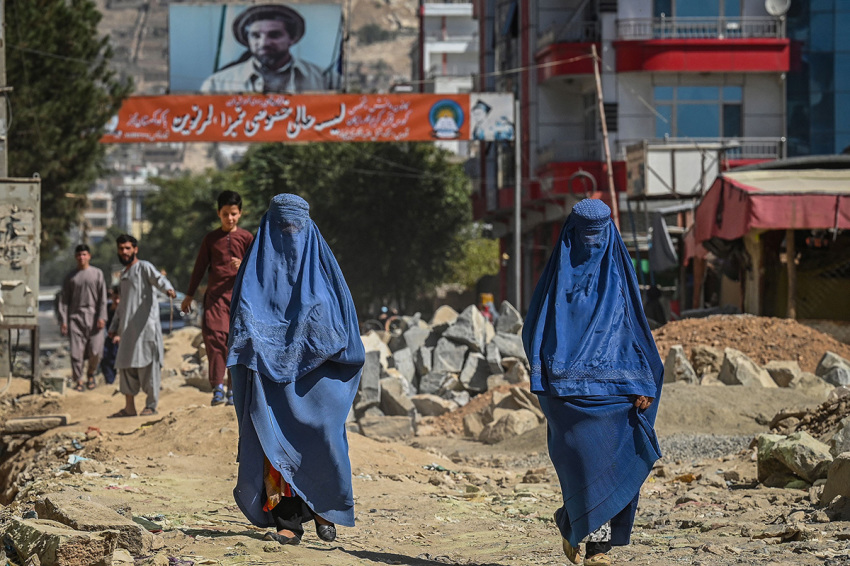UN, human rights groups condemn Taliban's violent crackdown on women-led protests, journalists

The United Nations and human rights groups have condemned the Taliban's ban on all demonstrations and the use of violence days after women took to the streets to protest Afghanistan's newly formed interim government that includes more than a dozen leaders who are designated terrorists and ex-Guantanamo detainees.
In a statement released Friday, the U.N. condemned the Taliban for its “increasingly violent response” to organized peaceful protests in which militants used “live ammunition, batons and whips” to beat women and journalists.
“We call on the Taliban to immediately cease the use of force towards, and the arbitrary detention of, those exercising their right to peaceful assembly and the journalists covering the protests," a spokeswoman for the U.N. High Commissioner for Human Rights said in a press statement, adding that the Taliban killed four people during recent demonstrations.
Taliban fighters shot and killed two men and wounded several others during demonstrations in Kabul Tuesday, and beat and detained several women and up to 15 journalists, the spokesman said. During protests in Nangarhar and Kunar provinces last month, the Taliban killed a man and a boy and wounded eight others after firing their weapons into the crowds.
“As Afghan women and men take to the streets during this time of great uncertainty in their country to press peacefully for their human rights to be respected — including women’s right to work, to freedom of movement, to education and political participation — it is crucial that those in power listen to their voices,” the U.N.'s statement continued.
The beating of women and journalists in Kabul’s Karte Char neighborhood occurred on the same day the Taliban announced the ban on all slogans, demonstrations and protests that don’t have official approval, The Wall Street Journal reported.
“Their government doesn’t count us as citizens of this country even though we are half of the population,” a protesting woman was quoted as saying. “We don’t care if they beat us or even shoot us, we want to defend our rights. We will continue our protests even if we get killed.”
Taliban fighters called the protesting women "agents of America."
Responding to the protests, the new regime’s interior ministry, which is headed by Sirajuddin Haqqani, a member of the Haqqani network that has long been designated as a terrorist organization by the U.S. State Department, warned that such protests would be treated as illegal and participants would face “severe legal consequences” unless approved by authorities at least three hours in advance, The Epoch Times reported.
At a large protest by men and women on Tuesday, members of the Taliban fired shots into the air to disperse the demonstration held outside the Pakistan embassy in Kabul and arrested reporters.
“Taliban authorities are obligated under international law to respect and uphold everyone’s right to peaceful protests and to respect the rights of women and girls,” Patricia Gossman, associate Asia director at Human Rights Watch, said in a report.
“Concerned governments should press the Taliban to protect free expression and peaceful assembly,” she said.
The report also said that Taliban security forces on Tuesday detained journalists from Etilaat-e Roz — Taqi Daryabi and Nemat Naqdi — for covering a protest in Kabul. The journalists were taken to a police station in Kabul, placed in separate cells and severely beaten with cables before being released on Wednesday.
“Taliban authorities claimed that they would allow the media to function so long as they ‘respected Islamic values,’ but they are increasingly preventing journalists from reporting on demonstrations,” Gossman added.
Nemat Naqdi, a video journalist, and Taqi Daryabi, video editor, from the Etilaatroz newspaper undress to show their wounds after Taliban fighters tortured and beat them in custody after being arrested for reporting on a women’s rights protest in Kabul, Afghanistan.
— L.A. Times Photos (@latimesphotos) September 9, 2021
???? @yamphotopic.twitter.com/ipQ658KQMN
The Taliban’s crackdown on protests and journalists is raising concerns among religious minorities, especially Christians, as they fear increased oppression and persecution as the Taliban have promised strict enforcement of Sharia law, the U.S.-based persecution watchdog International Christian Concern said.
Almost all Afghan Christians — estimated to be between 8,000 and 12,000 — are converts from Islam and remain largely closeted and hidden from the public eye due to severe persecution.
“Their status as converts makes Afghan Christians direct targets for persecution by both extremist groups and society in general,” ICC said. “In Afghanistan, leaving Islam is considered extremely shameful and converts can face dire consequences if their conversion is discovered.”
The fears are not unfounded, given the new leadership.
“Prior to the Taliban’s takeover of the country, Afghanistan was one of the hardest places in the world to be a Christian,” ICC’s Regional Manager for South Asia, William Stark, said. “With the Taliban now in complete control and likely to return the country to the oppression of the 1990s, it will be nearly impossible to be a Christian in Afghanistan.”
Five of the newly-appointed leaders were in detention in Guantánamo and later exchanged for Bowe Bergdahl in 2014, according to Long War Journal.
Mullah Haibatullah Akhundzada, the current “Emir of the Faithful” or top leader of the Taliban, issued religious decrees justifying the Taliban’s operations, including suicide attacks, from 1996 to 2001, the Journal said.
Mullah Mohammad Hassan Akhund, the acting head of state, refused to turn over Osama bin Laden after the al Qaeda terror group bombed the U.S. Embassy in August 1998.
Akhundzada and Akhund are among more than a dozen new leaders who were sanctioned by the U.N. Security Council in early 2001.



























